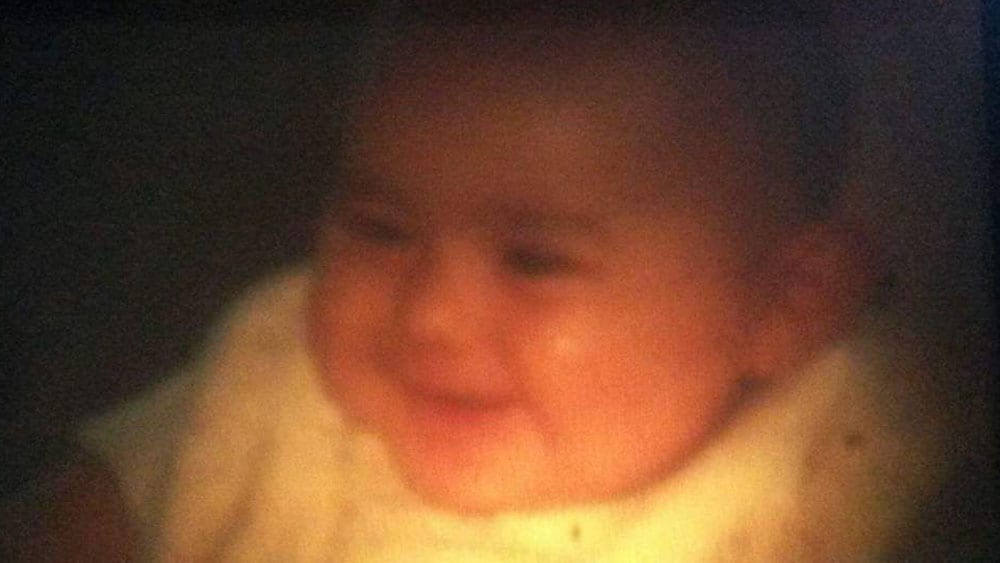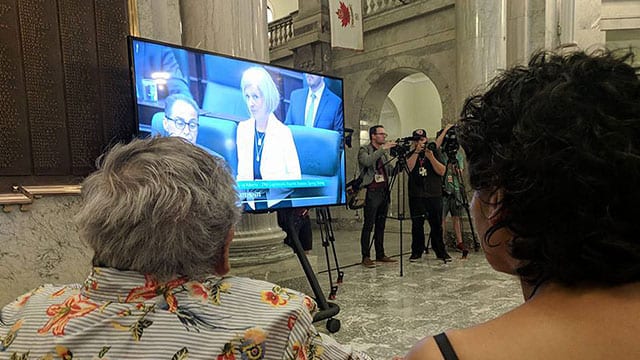For only the second time in Canada, a provincial government has apologized for its role in the ‘60s Scoop, when thousands of Indigenous children were taken from their homes and placed in foster care.
“The decisions that led to that personal trauma, many of those decisions were made right here on this floor, in this chamber,” Premier Rachel Notley told the Alberta Legislature Monday.
Notley follows then-premier Greg Selinger of Manitoba, who was the first provincial leader to apologize in 2015.
Both were NDP governments.
“For this trauma, this pain, this suffering, alienation and sadness, we are sorry,” Notley told scoop survivors, Indigenous leaders and provincial politicians in the House.
Notley acknowledged the historic event wouldn’t have happened without the lobbying efforts of the Sixties Scoop Indigenous Society of Alberta.
The Society, comprised of scoop survivors, spent the past two years educating politicians and the public about who was scooped and why.
“It’s one thing to acknowledge the damage that’s been done,” said former Society director and survivor Lew Jobs of Edmonton.
“And, yes, you’re going to stand up and you’re going to make a public apology and say all the right things. But I want to know what’s going to happen afterwards.”
Jobs was a baby when he was seized from his Inuit mother in Northwest Territories and raised by a white teacher in Edmonton. He was cut off from his culture, language and people.

The only baby photo ’60s Scoop survivor Lew Jobs has.
He is one of an estimated 20,000 Indigenous children Canada-wide apprehended from their birth families by provincial officials during the 1960s, ‘70s and ‘80s and raised by strangers.
Compensation is on the table in a proposed settlement offered by the federal government that would pay each survivor between $25,000 and $50,000 to a maximum of $750 million.
But the settlement, which has cleared one legal hurdle in federal court and awaits a second in Toronto later this week, is controversial.
It does not have unanimous support and could still be scuttled if 2,000 or more survivors opt out.
Saskatoon lawyer Doug Racine represents about 150 survivors from across Canada who, he says, may also launch an appeal.
“There are unhappy with the lack of consultation, restrictions on being able to file future lawsuits, and the difficulty obtaining their social service records,” Racine said in a telephone interview Monday.
Colleen Rajotte, of Winnipeg, is president of the Manitoba ‘60s Scoop Survivors Association. She says her group is poised to file a new, national, class-action lawsuit against the federal government if the settlement proposal fails.
“The number of survivors objecting is growing,” she said. “It’s really encouraging.”
The Alberta apology kicked off with a pipe ceremony, grand entry into the Legislature, and smudging ceremony.
Jobs was there to hear Notley’s words in person and said she very nearly didn’t apologize on the record.
He says the government wanted to do it in the rotunda instead of in the House.
“We pushed for it to be in the Legislature, recorded on Hansard,” Jobs said in a telephone interview.

Survivors listen to Alberta Premier Rachel Notley.
Notley followed up her apology by pledging to work with Alberta’s Indigenous people and reflect their needs in its decisions.
“Saying sorry is one thing,” said Jobs, who has decided to opt in to the settlement agreement even though it’s not perfect.
“There has to be action.”










“The Society, comprised of scoop survivors, spent the past two years educating politicians and the public about who was scooped and why.”
I would be truly interested in understanding who was scooped and why. Who is to say it wasn’t in the best interest of the child at the time?
“The Society, comprised of scoop survivors, spent the past two years educating politicians and the public about who was scooped and why.”
I would be truly interested in understanding who was scooped and why. Who is to say it wasn’t in the best interest of the child at the time?